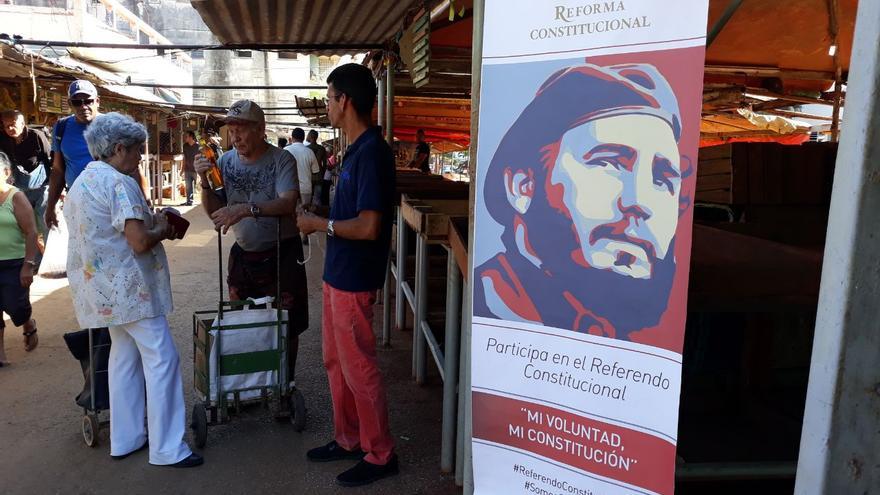
![]() 14ymedio, Havana, 24 February 2019 — Pressures to vote Yes, lack of privacy and the refusal to let voters to use a ballpoint pen to mark their ballots, instead of the “official” pencil, are some of the irregularities that have been reported to 14ymedio during the constitutional referendum that is taking place this Sunday in Cuba.
14ymedio, Havana, 24 February 2019 — Pressures to vote Yes, lack of privacy and the refusal to let voters to use a ballpoint pen to mark their ballots, instead of the “official” pencil, are some of the irregularities that have been reported to 14ymedio during the constitutional referendum that is taking place this Sunday in Cuba.
“When I went to vote in the cubicle, the president of the polling station asked a pioneer [elementary school student] to accompany me,” an anonymous architect living in Centro Habana in the vicinity of the Malecon told this newspaper. “The girl went into the booth with me and told me that if I wanted to vote for the homeland I had to check Yes.”
After much insistence, the woman managed to remain alone on the booth and exercise her right to vote with privacy, but she reports that “evading the pressure was difficult” and that she felt that “everything was prepared to avoid a No vote.”
The current Electoral Law establishes that the authorities must ensure that “the booths have the required conditions to ensure the secrecy of the vote,” while schoolchildren, the uniformed little pioneers, must remain by the ballot box to be witnesses to the moment in which the ballot is placed through the slot.
However, more than twenty reports arrived at the newsroom of this newspaper giving accounts of cubicles without doors or curtains and people loitering around the voters as they voted. There were also reports of an “overreaching” performance by the pioneers with regards to the privacy of the voters.
Another complaint is that people are not allowed to use a ballpoint pen to exercise their vote with an indelible ink that prevents the later erasure of the ballot, a suspicion that many voters have. “I took a pen to the polling place in Trinidad where I voted, because I’m traveling outside Havana,” writes a reader of this newspaper that brought a pen to exercise the vote.
“They told me that if I voted with a pen I was going to cancel the ballot,” she said. “In any event, I marked next to the No with the pen but now I’m worried about whether my vote will be valid or not.”
Recently, the independent media El Toque published 10 tips for Cuban voters and recommended the “indelible vote” noting “that’s what the pens are for and not the pencils commonly found in Cuban polling stations.” Article 114 of the Electoral Law establishes that ballots are declared null and void where “the will of the voter cannot be determined.” It is never said that a pencil should be used and that ballpoint pens are prohibited.
In the town of Placetas, several residents also complained of pressures to go to vote, with members of the Committee for the Defense of the Revolution knocking on their doors so that “nobody stays home.” The vote in Cuba is not obligatory but many fear sending a social signal if they do not go to the polls.
In many polling places posters have also been visible with the official campaign for Yes, with photos of Fidel and Raúl Castro, or calls to preserve the Revolution and socialism.
As of 9:00 am this Sunday, 2,690,419 voters had voted, 30.64% of the total registration, according to María Esther Bacallao, secretary of the National Electoral Commission.
________________________
The 14ymedio team is committed to serious journalism that reflects the reality of deep Cuba. Thank you for joining us on this long road. We invite you to continue supporting us, but this time by becoming a member of 14ymedio. Together we can continue to transform journalism in Cuba.
